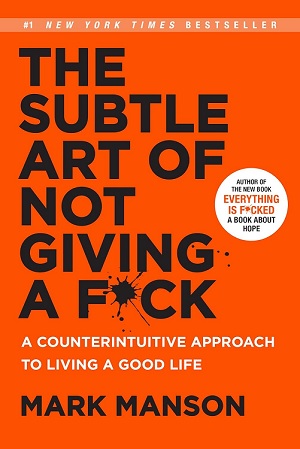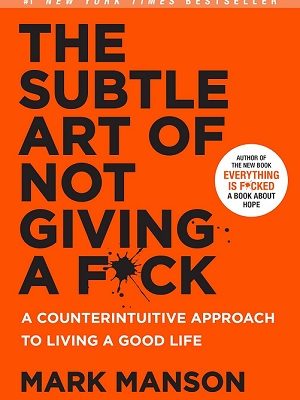The Subtle Art of Not Giving a F*ck by Mark Manson challenges many popular ideas about happiness, success, and what it means to live a fulfilling life. With humor and brutal honesty, Manson offers a unique perspective on how to prioritize what matters, embrace life’s struggles, and redefine success on your own terms. Below are key lessons from the book in an easy-to-understand way.

Read: F*ck Feelings
1. Limit Your “F*cks” – Choose What to Care About
One of Manson’s central ideas is that we all have limited energy, time, and attention—what he calls “f*cks.” We can’t care about everything, so it’s crucial to be selective about what we give our energy to.
- Key Takeaway: Care deeply about the things that truly matter, and let go of things that don’t.
- Application: Instead of stressing over social media approval or other people’s opinions, focus on what brings you real value: your personal goals, relationships, and well-being.
Lesson: The secret to a better life isn’t giving a f*ck about more things, but about fewer, more meaningful things.
2. Happiness Comes from Solving Problems
Manson argues that happiness is not achieved by avoiding problems but by solving them. Life is full of challenges, and it’s through tackling these challenges that we find purpose and satisfaction.
- Key Takeaway: Happiness is a process, not a destination.
- Application: Accept that problems are a natural part of life. Instead of trying to avoid difficulties, embrace them as opportunities for growth.
Lesson: Don’t wish for a life without problems—wish for better problems that align with your values.
3. You’re Not Special – Embrace Humility
In a society that often celebrates individualism and success, Manson emphasizes the importance of humility. Believing you’re “special” or entitled to extraordinary success can set you up for disappointment.
- Key Takeaway: Accept that you are not inherently entitled to anything more than anyone else.
- Application: Instead of chasing validation or feeling superior, focus on personal growth, meaningful work, and authentic connections with others.
Lesson: True fulfillment comes from humility and personal responsibility, not entitlement or self-centered pursuits.
4. The Value of Suffering
Manson suggests that we often avoid suffering, but in reality, the things worth striving for usually require some level of discomfort. Whether it’s achieving professional goals, maintaining relationships, or personal growth, meaningful experiences come with some degree of pain or struggle.
- Key Takeaway: Choose the kind of suffering that aligns with your values.
- Application: If you want to improve in a particular area, be ready to embrace the effort, failure, and discomfort that come with it.
Lesson: There’s no escaping pain in life, but you can choose which struggles are worth enduring.
5. Take Responsibility for Everything in Your Life
One of the most empowering ideas in the book is taking responsibility for everything in your life, even the things that aren’t your fault. While we can’t control everything that happens to us, we can control how we respond.
- Key Takeaway: Blaming others or external circumstances only leads to helplessness.
- Application: Focus on what you can control. Even if something isn’t your fault, take responsibility for how you react and move forward.
Lesson: Taking full ownership of your life leads to empowerment and better outcomes.
6. Freedom Comes from Commitment
Manson points out a paradox: while we often seek freedom by keeping our options open, true freedom actually comes from making commitments—whether to relationships, work, or personal goals.
- Key Takeaway: By committing to fewer things, you can focus more on what matters and find deeper satisfaction.
- Application: Instead of trying to do everything, narrow your focus. Invest time and energy into relationships, career paths, and passions that align with your values.
Lesson: Freedom isn’t about doing everything you want; it’s about committing to what’s meaningful.
7. The Importance of Values
Values are a central theme in the book. Manson explains that our values shape how we view the world, how we act, and ultimately how we live our lives. Having the right values leads to a fulfilling life, while poor values lead to dissatisfaction and stress.
- Good Values: Manson suggests that good values are reality-based, socially constructive, and immediate and controllable. Examples include honesty, integrity, and responsibility.
- Bad Values: Bad values are socially destructive, reliant on external validation, and uncontrollable. Examples include fame, material success, and constant happiness.
- Key Takeaway: Evaluate your values and determine if they are helping or hurting your pursuit of a meaningful life.
- Application: Identify values that serve you well in the long term, such as personal responsibility, kindness, and growth.
Lesson: Your values determine your success and fulfillment in life. Choose them carefully.
8. Death is the Ultimate Motivator
Manson believes that contemplating death can lead to a deeper understanding of what’s truly important. Accepting your mortality forces you to focus on what really matters in life.
- Key Takeaway: Recognizing that life is finite helps clarify your priorities.
- Application: Use the knowledge of your inevitable death as motivation to live fully and meaningfully in the present. Don’t waste time on superficial pursuits.
Lesson: When you accept death, you can truly begin to live.
9. Failure is the Way Forward
Failure is often seen as something to avoid, but Manson argues that failure is essential for growth. It teaches you valuable lessons and helps you improve.
- Key Takeaway: Success is built on a foundation of repeated failures and learning.
- Application: Don’t fear failure. Instead, embrace it as part of the process toward achieving your goals.
Lesson: The more willing you are to fail, the more likely you are to succeed.
10. Uncertainty is a Part of Life
Manson encourages readers to embrace uncertainty. Life is unpredictable, and trying to control everything only leads to frustration. Accepting uncertainty allows you to grow and learn from life’s unexpected turns.
- Key Takeaway: Embrace the unknown and view it as an opportunity for growth.
- Application: Rather than seeking certainty in every aspect of life, be open to new experiences and allow uncertainty to guide you toward growth.
Lesson: Growth and success often come from embracing the unknown, not from controlling everything.
Conclusion
In The Subtle Art of Not Giving a F*ck, Mark Manson challenges the conventional pursuit of success, happiness, and self-improvement. The book teaches that focusing on what truly matters, embracing life’s struggles, and taking responsibility for your actions leads to a more meaningful and fulfilling life (Amazon).
By applying these lessons:
- You can let go of trivial concerns and focus on what truly brings value.
- You can embrace discomfort as a path to personal growth.
- You can live with a sense of purpose, free from external validation and unrealistic expectations.



